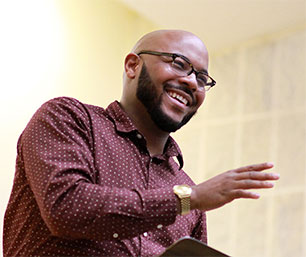The Wabash College Malcolm X Institute of Black Studies (MXIBS) presents speaker Nate Marshall, whose virtual talk will highlight a day commemorating the life and leadership of Rev. Martin Luther King Jr. Marshall’s virtual talk will take place at 7:30 p.m., Monday, Jan. 18.
Register in advance for this program by noon on Saturday, Jan. 16 at https://wabash.zoom.us/meeting/register/tJIlcuigqT8sGdCNqVuN4xr-GcmfYgsgM6s0
After registering, you will receive a confirmation e-mail containing information about joining the meeting.
 Marshall is a writer, rapper, and educator from the South Side of Chicago. He is the author of FINNA (One World, Penguin Random House, 2020), Wild Hundreds (University of Pittsburgh Press, 2015), winner of the Black Caucus of the American Library Association’s award for Poetry Book of the Year and The Great Lakes College Association’s New Writer Award.
Marshall is a writer, rapper, and educator from the South Side of Chicago. He is the author of FINNA (One World, Penguin Random House, 2020), Wild Hundreds (University of Pittsburgh Press, 2015), winner of the Black Caucus of the American Library Association’s award for Poetry Book of the Year and The Great Lakes College Association’s New Writer Award.
He is also an editor of The BreakBeat Poets: New American Poetry in the Age of Hip-Hop (Haymarket Books, 2015) and the co-author, with Eve L. Ewing, of No Blue Memories: The Life of Gwendolyn Brooks. Marshall previously served as the Assistant Director of Wabash College’s MXIBS, where he was also a Visiting Assistant Professor of English and Black Studies.
“We are thrilled to have Brother Marshall join us to reflect upon the impact of Dr. King's life,” said Steven Jones, Dean for Professional Development and Director of the MXIBS. “Nate has demonstrated his ability to connect with all students in the classroom. I have always been impressed with the kind words students would share after his classes at the MXIBS while serving as a Visiting Assistant Professor here.”
Marshall’s talk will cap a day that celebrates the impact and leadership of Dr. King more than 50 years after his assassination, and according to Jones, could provide some solace early in this new year.
“Given the turmoil America experienced in 2020, this year's Dr. Martin L. King Jr. holiday celebration should mean so much more to each of us,” he said. “Dr. King fought for justice until the evening he was shot down in Memphis. He gave his life so that we would one day judge each other by the content of our character and not by the color of our skin. King's legacy is larger than his ‘I Have A Dream’ speech and I remain hopeful that the humanity he gave his life for will one day be embraced by all Americans.”
The virtual talk is open to the public.